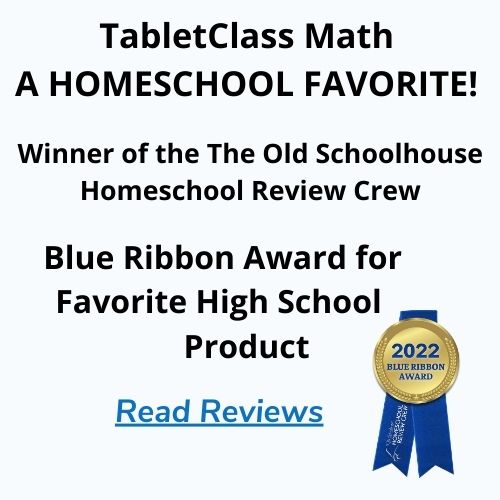Homeschool Algebra 1 With the Right Math Teacher!
“It is such a great moment when a parent can see a light turn on and it all makes sense again. I am grateful for the gifts this program has given us.”




TabletClass Math makes homeschooling Algebra 1 easy. We include the right amount of instruction your child needs to excel.
Our teacher, John Zimmerman, cares about your child’s success. He guides students every step of the curriculum with clear and understandable instruction that will help build their confidence in math.
Homeschool Algebra 1 Curriculum Summary
The homeschool algebra 1 curriculum is designed for those students entering a high school level/college prep math track. Before starting this course students should have finished a Pre-Algebra or equivalent course (8th grade math as an example). Upon completion of the Algebra 1 homeschool curriculum students can continue on to Geometry or Algebra 2 homeschool curriculum.
The first part of the homeschool algebra 1 curriculum is focused on real numbers, absolute value, equations/formulas, graphing and writing linear equations to including graphing absolute value functions. The next part of the algebra 1 curriculum deals with functions and relations and solving quadratic equations. Linear systems are studied in-depth to include linear programming.
Lastly, the curriculum focuses on polynomial operations and factoring techniques. Powers and exponents are also covered, along with methods to simplify various radical and rational expressions and equations.
“We are enjoying TabletClass as a means for our homeschooling Alg. 1 class. I say we because, I’m also relearning algebra for myself along with my son. I have always loved math and this is great. I have even referred it to friends of mine that were going to spend $250.00 per month on taking their child to Sylvan Learning Center. I encouraged them to give you a try first, and their child went from almost failing, to an A on their report card. They have only been using Tablet Class for a little over a month. They love it and so does their son. I only wish that I would have had a program like this for my daughter that just graduated high school this past may. She really struggled and I think this would have really been great for her. Thank you so very much for providing a wonderful program.”
-Devonda C., TN
Algebra 1 Scope & Sequence
Chapters
Sections
Videos
Chapters
Sections
Videos
Chapter 1: Introduction to Algebra Terms and Concepts
This chapter introduces students to basic terms and concepts used in algebra. Time is taken to ensure the student understands basic number operations, variables and their applications. Additionally, the student gains a fundamental sense of equations, inequalities and their solutions.
Sections:
- 1.1 Number Operations
- 1.2 Variables
- 1.3 Order of Operations
- 1.4 Translating Verbal and Algebraic Phrases
- 1.5 Equations / Inequalities / Solutions
Chapter 2: Real Numbers and Simplifying Variable Expressions
This chapter focuses on getting the student to master working with the Real Numbers. Students learn the rules of integers and practice through many examples. Also, students will learn to apply the Distributive Property and simplify variable expressions by combining like terms.
Sections:
- 2.1 Real Number System
- 2.2 Adding Real Numbers
- 2.3 Subtracting Real Numbers
- 2.4 Multiplying and Dividing Real Numbers
- 2.5 Distributive Property
- 2.6 Simplifying by Combining Like Terms
Chapter 3: Solving Equations
Solving Equations chapter breaks down the steps to solve multi-step linear equations. Students will build up their skills as they progress from one and two-step equations to more advance equations. Core concepts involved will be reviewed to include the Distributive Property and combining like terms.
Sections:
- 3.1 One Step Equations
- 3.2 Solving Two Step Equations
- 3.3 Solving Multi-Step Equations
- 3.4 Formulas and Literal Equations
Chapter 4: Graphing Linear Equations
This very important chapter on Graphing Linear Equations walks the student step-by-step to mastering how to graph linear equations. Concepts involving the coordinate plane, slope and methods to graph lines are thoroughly reviewed and introduced. Upon completion of the chapter students will gain the necessary knowledge and skills needed to learn more advance topics involving linear equations.
Sections:
- 4.1 Graphing Lines with One Variable
- 4.2 Graphing Lines with Two Variables
- 4.3 The Slope of a Line
- 4.4 Slope Intercept Method
- 4.5 XY Intercept Method
Chapter 5: Writing the Equations of Lines
Writing the Equations of Lines chapter builds on the student’s prior knowledge and skill of linear equations. Various methods to find and write the equation of a line are introduced and practiced. The chapter focuses on the proper way to set-up and use formulas to write linear equations. Additional related topics are explored to include linear models, linear regression and word problems.
Sections:
- 5.1 Using Slope-Intercept Form
- 5.2 Using Point-Slope intercept
- 5.3 Given the Slope and a Point
- 5.4 Given Two Points
- 5.5 Standard Form of Linear Equations
- 5.6 Best Fitting Lines and Scatter Plots
- 5.7 Linear Models / Word Problems
Chapter 6: Inequalities
In this chapter students will apply their equation solving skills to solve linear inequalities. Basic concepts and terms are introduced first, along with how to graph inequalities.
Sections:
- 6.1 Linear Inequalities
- 6.2 Compound Inequalities
- 6.3 Graphing Linear Inequalities in Two Variables
Chapter 7: Systems
Understanding systems and the methods to solve them are vital in algebra. This chapter introduces/reviews techniques to solve linear systems. Students will also explore special systems, word problems and systems of linear inequalities. Lastly, the topic of Linear Programming will be introduced. This powerful way to use systems in business and industry will connect the chapter’s concepts to “real world” applications.
Sections:
- 7.1 Solving Systems by Graphing
- 7.2 Solving Systems Substitution Method
- 7.3 Solving Systems by Elimination / Linear Combination
- 7.4 Solving Linear Systems Word Problems
- 7.5 Special Linear Systems
- 7.6 Solving Systems of Linear Inequalities
- 7.7 Linear Programming
Chapter 8: Absolute Value
Absolute value problems can be challenging for some students to grasp. Time is taken to teach students core concepts and build understanding. Students will learn how to graph absolute value functions and apply the steps to solve absolute value equations/inequalities.
Sections:
- 8.1 Introduction to Absolute Value
- 8.2 Graphing Absolute Value Equations
- 8.3 Solving Absolute Value Equations
- 8.4 Absolute Value Inequalities
Chapter 9: Powers and Exponents
This chapter covers the rules of powers and exponents a student needs to learn in algebra. Also, important applications of these rules are covered to include scientific notation, compound interest and exponential growth and decay.
Sections:
- 9.1 Product and Power Rules of Exponents
- 9.2 Negative and Zero Exponents Rules
- 9.3 Division Rules of Exponents
- 9.4 Scientific Notation
- 9.5 Compound Interest
- 9.6 Exponential Growth and Decay
Chapter 10: Polynomials and Factoring
The first part of the chapter covers the parts of a polynomial, related terminology and how to perform polynomial operations. A special focus is placed on avoiding common mistakes. The second part of the chapter focuses on the extremely important skill of factoring polynomials. Students will first understand how to factor out a polynomial GCF and build on this to learn many techniques to factor polynomials.
Sections:
- 10.1 Introduction to Polynomials
- 10.2 Adding and Subtracting Polynomials
- 10.3 Multiplying Polynomials
- 10.4 Multiplying Polynomials Special Cases
- 10.5 Sum and Difference of Two Cubes
- 10.6 Factoring Greatest Common Factor
- 10.7 Factoring Quadratic Trinomials
- 10.8 Special Factoring Rules
Chapter 11: Introduction to Quadratic Equations
Understanding the properties and methods to solve quadratic equations is essential for the student to advance in algebra. This chapter explains each concept in a very specific and focused manner. After students have been introduced to quadratic equations they build up their knowledge by learning various techniques to solve them. Additionally, they will learn the connection between solutions and graphs of quadratic functions. The chapter ends by covering quadratic inequalities and word problems.
Sections:
- 11.1 Introduction to Quadratic Equations
- 11.2 Solving Quadratic Equations by Square Roots
- 11.3 Graphing Quadratic Equations
- 11.4 The Quadratic Formula
- 11.5 Solving Quadratic Equations by Factoring
- 11.6 The Discriminant – Types of Roots
- 11.7 Completing the Square
- 11.8 Quadratic Equation Word Problems
- 11.9 Graphing Quadratic Inequalities
Chapter 12: Functions and Relations
Sections:
- 12.1 Introduction to Functions and Relations
- 12.2 Function Operations
- 12.3 Inverse Functions
- 12.4 Graphing Functions
- 12.5 Linear and Nonlinear Functions
- 12.6 Composite Functions
Chapter 13: Rational Expressions
Sections:
- 13.1 Ratios and Proportions
- 13.2 Percent
- 13.3 Direct and Inverse Variation
- 13.4 Simplifying Rational Expressions
- 13.5 Multiplying and Dividing Rational Expressions
- 13.6 Finding the LCD of Rational Expressions
- 13.7 Solving Rational Equations
- 13.8 Adding and Subtracting Rational Expressions
Chapter 14: Radical Expressions/Equations
Sections:
- 14.1 Simplifying Radicals
- 14.2 Operations with Radicals
- 14.3 Solving Radical Equations
- 14.4 The Distance and Mid-Point Formula
- 14.5 The Pythagorean Theorem
Chapter 15: Data, Measurement and Probability
This chapter is a fundamental overview of how to work with data. Sections in the chapter introduce units of measures, conversion, mean, median, mode and range. Also, included is a section on graphs and plots such as box-and-whisker plots and frequency tables. The chapter also provides a section on the basic concepts of probability to include a discussion into the Law of Large Numbers. Lastly, there is a section on counting theory which will take a look at how to count using trees and the Fundamental Principle of Counting.
Sections:
- 15.1 Units of Measure and Conversion
- 15.2 Measures of Central Tendency – Mean, Median and Mode
- 15.3 Exploring Data – Charts, Tables, Graphs and Plots
- 15.4 Introduction To Probability
- 15.5 Counting Theory
“TabletClass saved my daughter’s Algebra grade. She was enrolled in an online Algebra class through Keystone, and the class was really a struggle for her. It was organized very poorly in my opinion, in the order of subjects addressed. When she got stuck and emailed her teacher, she got a two word answer “page 367” as “help.” She is not a strong math student anyway, and it was becoming a $400 nightmare. Enter TabletClass, and suddenly- she was learning! By matching up your video topics to her quizzes and tests, she was able to complete the Algebra class and actually understand. She has been working through your excellent pre Algebra to review and fill in holes, and we plan to use TabletClass for Algebra 2 and skip the expensive, dry textbook, math from here on out. Thank you so very much for making a product for home schooled kids that WORKS. Clear explanations, lots of review, and a reasonable price. One of the best home school purchases we ever made!”
-Cami (Virginia, US, home school parent)
TabletClass Math provides everything your child needs to master math with confidence and ease.
Expert-Led Instruction
Benefit from our teacher's 25+ years of experience with our comprehensive math courses, ensuring your child receives the highest quality education.
Comprehensive Lessons
Engaging, in-depth lessons designed for all learning styles. Includes lesson videos and practice problem examples covering a wide range from basic to advanced.
Worksheets, Notes & Quizzes
Worksheets and summary notes align with each section topic for maximum practice. Quizzes help identify areas for improvement ensuring comprehension.
Parent Resources
Access pacing guides, tests with answer keys, and a final exam via the Parent Portal to track progress, calculate grades, and issue a homeschool completion certificate.
Sample Lesson Video
Example Problem Video
“As a homeschooling Mom of seven children, spanning 25 years, we have used multiple math curriculums. TabletClass Math is hands down, no comparison, the best we have used! I honestly am so thankful for it every day, What a relief to find a program that is thorough, no gaps, detailed steps for all kinds of learners, and it is enjoyable to learn with Mr. Zimmerman! I know because for the first time in my life, I have enjoyed math as I have worked alongside our boys. And, they are able to watch the videos as many times as they want and when they complete a course, Mr. Zimmerman has a final exam complete with study tips, etc. so that we know they are proficient. Thank you, thank you, thank you for Tabletclass Math!”
-Lisa S.
Ready to get started with Algebra 1?
Monthly Subscription – $25
(auto-renewal/cancel anytime)
6 Month Access – $95
(save $55 – one time fee/no auto-renewal)
12 Month Access – $150
(save $150 – one time fee/no auto-renewal)
Optional Parent Resources – $25
(Course Test Pack – one time fee/unlimited access)
“Our family has been using TabletClass for three years and plan on finishing up our homeschool math using this program. Our son completed Pre-Algebra through Algebra 2. Now our daughters are starting it. The concepts are taught in easy to understand bits. TabletClass is suited to students with a wide range of math abilities. The format is simple, clear and understandable. TabletClass tutorials make using the program comprehensible for even the most non computer savvy student or mom. Mr. Zimmerman uses an engaging style of teaching, making math less intimidating to non-math students, while gifted students are not bored. The students can set their own pace. The classes are available on a wide range of platforms. The program is very economical for any size family.”
-Sarah

